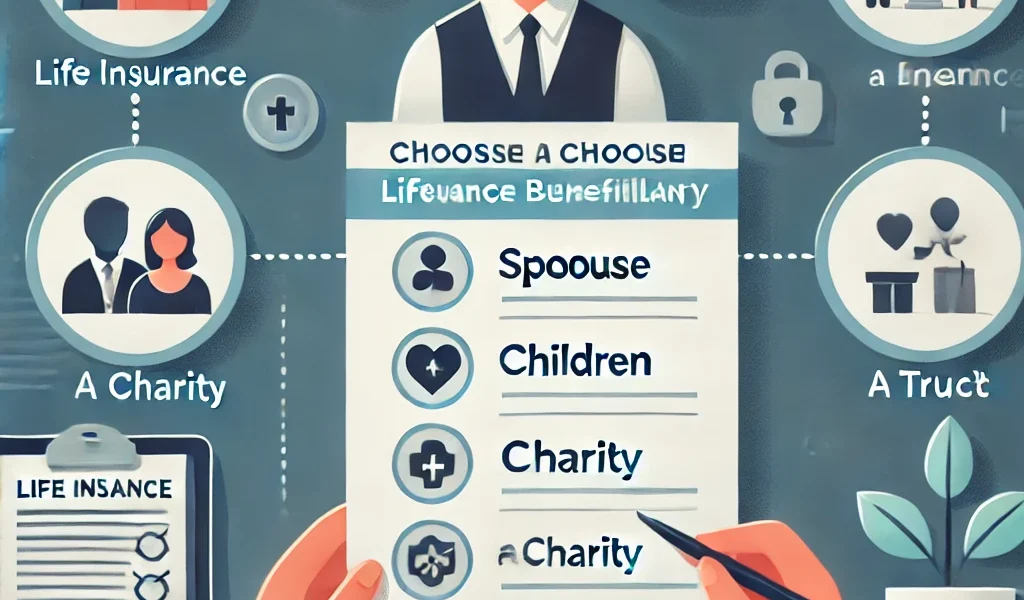Introduction
Choosing the right beneficiary for your life insurance policy is one of the most critical financial decisions you will make. Your beneficiary is the person or entity that will receive the death benefit when you pass away. Selecting the right individual or group ensures that your loved ones are financially secure and your final wishes are honored. This guide will help you navigate the process of choosing the right beneficiary while avoiding common mistakes.
Understanding Beneficiaries
A life insurance beneficiary is the individual or entity designated to receive the proceeds of your policy after your death. Beneficiaries can be:
- Primary Beneficiary – The first in line to receive the benefits.
- Contingent Beneficiary – The backup beneficiary if the primary beneficiary is unable to claim the benefit.
- Revocable Beneficiary – Can be changed at any time by the policyholder.
- Irrevocable Beneficiary – Cannot be changed without the beneficiary’s consent.
Who Can Be a Beneficiary?
You have several options when choosing a beneficiary, each with its own advantages and considerations:
1. Family Members
- Spouse: The most common choice, ensuring financial stability for your partner.
- Children: Helps secure their future education and living expenses.
- Parents: If they depend on you financially, this can be a good option.
- Siblings: If they rely on your support, they can be named as beneficiaries.
2. Trusts
- If you want more control over how the money is distributed, you can set up a trust.
- A trust ensures that minors or financially irresponsible beneficiaries do not misuse the funds.
3. Charities
- If you wish to leave a legacy, naming a charity as a beneficiary can help support a cause close to your heart.
4. Businesses
- Business partners can be named beneficiaries for buy-sell agreements.
5. Estate
- If you name your estate as the beneficiary, the payout becomes part of your assets and goes through probate, which may delay distribution.
Factors to Consider When Choosing a Beneficiary
- Financial Dependence:
- Choose a beneficiary who depends on your income or financial support.
- Age and Maturity:
- Minors cannot directly receive life insurance benefits. If naming a child, consider a guardian or a trust.
- Legal Considerations:
- Divorce, remarriage, and state laws can impact your beneficiary choice.
- Tax Implications:
- Life insurance payouts are generally tax-free, but some scenarios may have tax consequences.
- Multiple Beneficiaries:
- If you want to divide the benefits, specify the percentage each beneficiary should receive.
Common Mistakes to Avoid
- Not Naming a Beneficiary
- If you don’t name a beneficiary, the payout may go to your estate, causing delays and possible legal complications.
- Naming a Minor Without a Guardian or Trust
- Minors cannot directly receive life insurance proceeds. Without proper arrangements, the court may appoint a guardian.
- Failing to Update Your Beneficiary
- Life circumstances change. Update your beneficiary designation after major life events (marriage, divorce, birth of a child, etc.).
- Not Considering a Contingent Beneficiary
- If your primary beneficiary passes away before you and you haven’t named a contingent beneficiary, your policy may become subject to probate.
- Choosing the Wrong Type of Beneficiary
- If you name your estate as the beneficiary, it may lead to unnecessary legal and tax complications.
How to Update Your Beneficiary
- Review Your Policy Regularly
- Check your life insurance policy at least once a year or after major life changes.
- Contact Your Insurance Provider
- Request a change of beneficiary form and submit the required documentation.
- Inform Your Beneficiaries
- Make sure your chosen beneficiaries are aware of their designation and how to claim the benefit.
- Consult a Financial Advisor or Attorney
- If you’re unsure about your choice, a financial expert can help you make an informed decision.
Conclusion
Choosing the right beneficiary for your life insurance policy is essential for ensuring your loved ones are financially protected. By considering factors like financial dependence, age, and legal implications, you can make a well-informed decision. Regularly reviewing and updating your beneficiary designation will ensure that your final wishes are honored and that your loved ones receive the support they need.




